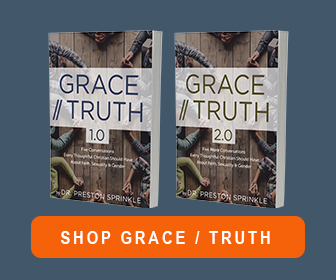
The following blog is written by Greg Coles. Greg is part of The Center's collaborative team and is the author of the book Single, Gay, Christian.
When one works in a bakery shortly before Christmas, one hears an inordinate quantity of Christmas pop music. I’m just a part-time employee right now—no more than three shifts a week—but still, by the time I finish out each week, Mariah Carey has wanted me for Christmas approximately seventeen times. I want to grab Wham! by the shoulders and yell, “Don’t give your heart away this Christmas, not even to someone SPESH-SHUL! You said the exact same thing last year, and here you are whining about it!”
“Don’t you think it’s weird,” asked one of my coworkers the other day as she was icing cupcakes, “that so many Christmas songs are love songs?”
Using our freshly honed knowledge of Christmas pop radio, we began rehearsing examples that confirmed her suspicion. Justin Bieber’s “Mistletoe”? Check. “Baby It’s Cold Outside”? Controversial, but still check. “Santa Baby”? Check, in a creepy kind of way. Soon our conversation turned to Netflix/Hallmark Christmas specials, that especially predictable brand of chick flicks filmed in snowy climes.[i] “What is it,” my coworker said, “that makes people get all mushy about Christmas?”
Of course, Christmas isn’t the only time of year when this happens. As one of our other coworkers was quick to observe, most non-Christmas pop music is also romantic, and people find excuses to be mushy all year round. But my first coworker’s question helped me finally put into words a cultural phenomenon that had been rankling me: the Ideal American Christmas Narrative.
According to the Ideal American Christmas Narrative as I encounter it, we are meant to spend our childhood Christmases in a state of constant euphoria, opening presents and eating cinnamon rolls and drinking eggnog while gazing between frosted windowpanes to a winter wonderland. In young adulthood, we meet someone SPESH-SHUL and fall in love under the mistletoe. We kiss on New Year’s Eve as the ball drops and get engaged during a light snowfall that sparkles like diamonds. After marriage, we are fruitful and multiply, and we dedicate our subsequent Christmases to giving our children the same Christmas euphoria we remember from our own youth, so that they can fall in love and kiss on New Years’ Eve and produce offspring of their own, and so on into perpetuity.
To be clear, I’m not saying this is what people actually do at Christmastime. This is just the ideal vision we seem to be aspiring to, the perfect Pinterest picture against which the quality of our real lives can be measured.
Christmas easily becomes awkward or painful for people, then, at whatever point their lives depart from this perfect narrative. When children throw a temper tantrum while unwrapping gifts. When single young adults don’t meet anyone SPESH-SHUL. When married couples can’t get pregnant. When relationships fall apart or loved ones pass away. Wherever our unedited, unphotogenic lives clash against the idyllic dream of what we think should be, we’re all the more prone to mourn the deficit.
When people feel sadder than usual at Christmastime, it’s often precisely because they believe they should be happier than usual at Christmastime.
Being celibate at Christmas—especially if you’re planning to stay that way indefinitely—is awkward because it feels like a fundamental betrayal of the Ideal American Christmas Narrative. How are you supposed to kiss under the mistletoe if you never kiss, period? How will you lavish your kids with Christmas euphoria if you never have kids? How can you make Christmas all about family when you sometimes spend Christmases with people you aren’t even related to?
As someone who likes both Christmas and celibacy (most of the time), this tension puts me in a bit of bind. Do I insist that celibacy needn’t place us as far afield from the Ideal American Christmas Narrative as it might at first seem? Or do I point out that maybe the Ideal American Christmas Narrative is in dire need of revision?
I choose a little bit of both.
First of all: Let me boldly suggest that the best elements of the elusive Christmas ideal can still be equally, if differently, enjoyed by celibate people. We celibate folks can still find people to belong among at Christmastime (and the rest of the year), whether these people are biological family or chosen family. We can still participate in moments of celebration and feasting and delight. We can still enjoy tender relational intimacy.
Check out Grace/Truth!
A small group learning experience designed to help Christians engage in conversations about faith, gender, and sexuality.
Last year, I spent a spectacularly makeshift Christmas day with my friends Carrie and Evan, both of whom are also single and live on my street. We made quiche in the morning, watched The Grinch around noon (quoting all the lines in perfect rhythm with Jim Carrey), spent the afternoon decorating Christmas cookies, then drove around town that evening delivering cookies to local friends like a couple of Will-Ferrell-sized elves. It wasn’t exactly a traditional Christmas, but it was glorious nonetheless.
Christmas with the celibates need not turn into Christmas with the Kranks, even if we eschew the mistletoe.
Second, and more important: There’s a big difference between the Ideal American Christmas Narrative and the Original Hebraic Christmas Narrative. Yes, both narratives involve marriage and a baby and a few Christmas presents. But the Original Hebraic Christmas Narrative is not about an uncomplicated, eggnog-soaked euphoria; it’s about shouts of joy and gasps of wonder borne out of challenge and uncertainty and discomfort. The marriage of Mary and Joseph isn’t about warm fuzzies as the New Year’s Eve ball drops; it’s about honor and commitment even when life doesn’t go the way you imagined it would. The birth of Jesus is not the product of Mary’s sexual union with a spouse; it is the product of the Holy Spirit’s indwelling in the midst of Mary’s virgin singleness.
Mary didn’t need sex or marriage in order for the presence of God to be birthed inside of her. In fact, the best gift she gave the world was a gift she was uniquely equipped to give because she was a virgin.
Likewise, the baby born to that virgin wasn’t born to find romance under the mistletoe or to build a family of his own. He was born to love the world beyond the confines of romance. He was born to make an orphaned humanity into the family of God.
In short, the two biggest heroes of Christmas have far more to do with celibacy than they do with marriage. Would it be too revolutionary if our Christmas celebrations reflected this reality?
[1] I don’t mean to sound too disdainful here. I love a good chick flick, predictable or otherwise. Last month I watched a Christmas movie on Netflix precisely because I wanted a story whose every plot element I could anticipate within the first ten minutes. The Princess Switch delivered, and I loved every second of it. Yes, I know this makes me plebeian. I regret nothing.

